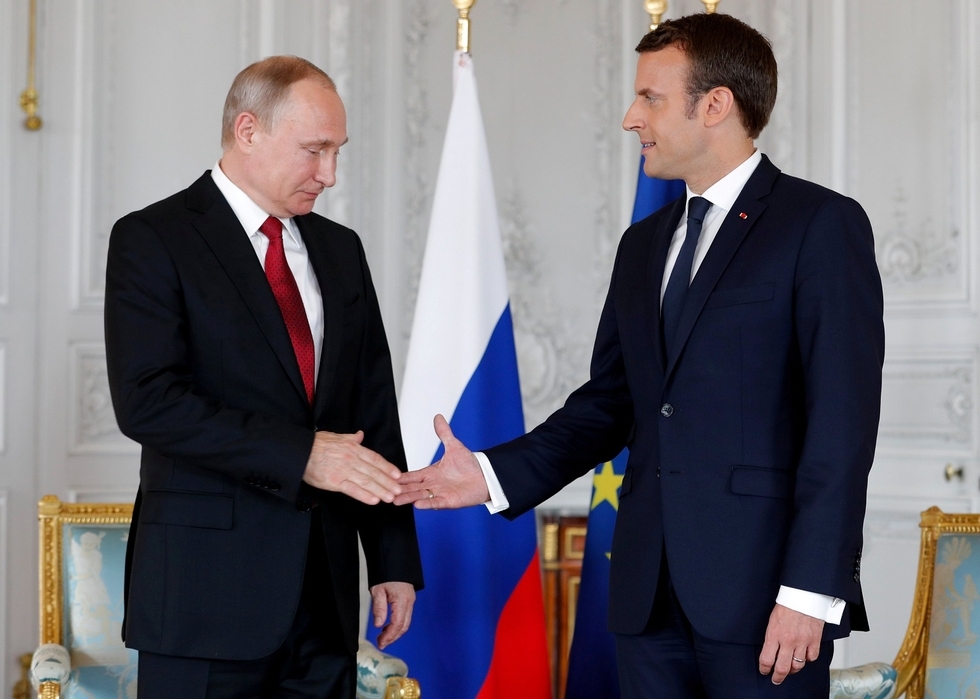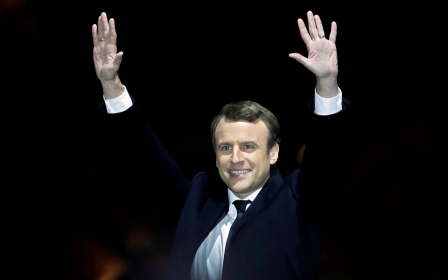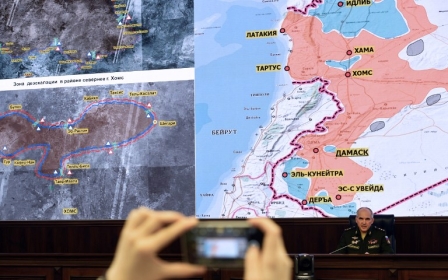Macron tells Putin Syrian chemical weapons are a 'red line'

The use of chemical weapons in Syria is a red line for France and would result in reprisals, President Emmanuel Macron said after meeting his Russian counterpart Vladimir Putin on Monday.
“Any use of chemical weapons would result in reprisals and an immediate riposte, at least where France is concerned," Macron said, standing next to Putin in the Versailles palace outside of Paris.
Macron and Putin sought to improve their countries' strained ties during talks the French leader described as "extremely frank".
Their first meeting since Macron took office provided another test of the Frenchman's diplomatic skills after his memorable vice-grip handshake last week with US President Donald Trump.
Macron told a news conference that France and Russia must cooperate to "eradicate terrorist groups" in Syria and did not directly criticise Moscow's role there. France and Russia back different sides in the Syrian conflict, with Putin supporting President Bashar al-Assad and Macron part of a western coalition that supports rebel groups and has accused Assad of using chemical weapons in the past.
Macron said it was essential to talk with all actors in the Syria conflict, including representatives of Assad.
“Our two countries will cooperate on Syria, this is essential," Macron said. "We need strong cooperation because we have a joint priority, which is the fight against terrorism."
Macron said he wanted Paris and Moscow to bolster intelligence-sharing on Syria and to work together on finding a political solution to the conflict, but gave no details on what a political deal might look like.
Putin, however, was less clear. He said he wasn't sure if France's Syria policy was "independent" because it was part of a US-led alliance, adding that Paris and Moscow had points of disagreement and agreement over Syria. According to Putin, the two leaders had agreed that the fight against terrorism was a top priority.
"Our absolute priority is the fight against terrorism and the eradication of terrorist groups and Daesh in particular," he said, using an alternate name for the Islamic State (IS) group that has claimed several deadly attacks in France.
Macron's warning of French retaliation in the event chemical weapons are used echo the “red line” policy used by the Donald Trump administration, who in April ordered cruise missile strikes in retaliation for a chemical weapons attack that Washington blamed on Damascus.
Former US president Barack Obama put himself in a tough spot with his ultimatum to Syria on the use of chemical weapons when he first used the “red line” phrase in August 2012. But he backtracked in the face of congressional opposition.
In April, Russia's deputy ambassador to the United Nations, Vladimir Safronkov, told the UN Security Council that Obama's threat of military action if a "red line" was crossed had provoked such attacks.
Syria agreed in September 2013 to destroy its chemical weapons programme under a deal negotiated with the United States and Russia after hundreds of people were killed in a sarin gas attack in the outskirts of the capital, Damascus.
But French intelligence concluded that forces loyal to Assad carried out a sarin nerve gas attack in April this year in northern Syria and that Assad or members of his inner circle ordered the strike, a declassified French report showed.
Assad has denied his government used chemical weapons.
New MEE newsletter: Jerusalem Dispatch
Sign up to get the latest insights and analysis on Israel-Palestine, alongside Turkey Unpacked and other MEE newsletters
Middle East Eye delivers independent and unrivalled coverage and analysis of the Middle East, North Africa and beyond. To learn more about republishing this content and the associated fees, please fill out this form. More about MEE can be found here.




